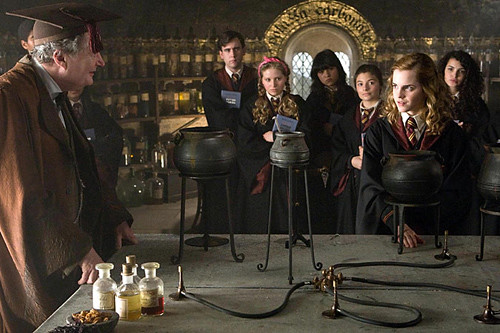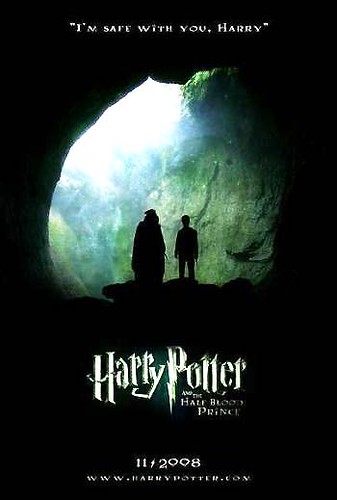William Bibbiani Reviews Harry Potter and the Half-Blood Prince!
In Harry Potter and the Sorcerer’s Stone, the world was introduced to Harry Potter as an unloved, underprivileged 10 year old whose bedroom made most toilet stalls look spacious. Then, over the course of the first book (and movie), J.K. Rowling showered this poor boy with love and adoration. The real world had no use for him, so he gets a magical new one in which he is the most important person alive. He had no friends, so he gets two fiercely loyal allies, including one who lets him copy her homework. His parents were dead, so practically every adult in the story lavishes him with both affection and gifts. Even his deadliest adversary, the ridiculously-named Voldemort, could be defeated by merely touching a hair on Harry’s godlike little head. Harry Potter, it seemed, was untouchable in his idyllic fantasy world for underprivileged children, and as a result the first book (and film) was a dull, saccharine affair of limited interest to many. It was only later, when Rowling began sadistically obliterating her creation’s perfect life piece by piece, book by book, that the fun really began.
Subsequent books introduced new themes of prejudice, slavery and genocide. Beloved characters were introduced, torn away, and usually murdered in front of Harry’s eyes. By the time Harry Potter and the Half-Blood Prince was released, everything beautiful in Harry Potter’s world had been balanced by something horrific and painful, leaving the sixth book in the franchise feeling less like fantasy and more like… well, high school. The title refers not to some magical artifact but to a used textbook, the plot has more to do with regret, heartache and drug abuse than any external threat, and the closest thing to a set piece isn’t so much Spielbergian as it is Lovecraftian. In short, it seemed damned near unfilmable, making it an entirely pleasant surprise that the film adaptation of Harry Potter and the Half-Blood Prince is one of the best in the series.

Enjoy the Half-Blood Prince’s Quidditch match, because it’s the last you’ll ever see.
Harry Potter (Daniel Radcliffe… again) returns to Hogwarts after his sixteenth birthday, and although war is officially upon both the wizarding and unsuspecting “muggle” world practically everyone in the film is still British and struggles valiantly to act as if nothing’s wrong. The hormonal teenaged cast of characters spends most of the film struggling with young love and experimenting with date rape and performance-enhancing drugs (and not always to negative effect). Harry loves Ron’s sister Ginny (Bonnie Wright) but doesn’t want to alienate his best friend, Hermione (Emma Watson… again) loves Ron (Rupert Grint… again) but Ron’s too daft to notice and traipses off with Lavender Brown (a comic relief subplot device played by Jessie Cave), so Hermione gives in to the overly hormonal advances of Cormac McLaggen (Freddie Stroma) in order to make Ron jealous, but Ron’s too daft to notice that too.
Meanwhile, Harry Potter receives classes in exposition from Professor Dumbledore (the still perfectly cast Michael Gambon, with apologies to Richard Harris), who insists that if Harry is going to defeat Voldemort (not Ralph Fiennes, actually) then he has to know how Voldemort turned evil in the first place. Dumbledore has been magically collecting memories from everyone who knew Voldemort before he went bad, but the most important memory of all – the only memory, in fact, which contains information on how to defeat Voldemort once and for all – belongs to Professor Horace Slughorn (the delightfully tragic Jim Broadbent), whose sense of shame has altered his own recollection of events, making it useless unless Harry can break down his psychological defenses. Harry also suspects that Draco Malfoy (Tom Felton in his best performance to date) is up to something with Professor Snape (the always perfect Alan Rickman), but no one believes Harry because, well, he always thinks Draco Malfoy and Professor Snape are up to something, and after six books/movies everyone else in the cast has figured out that they’re just red herrings.

Or are they?
And while Harry Potter and the Half-Blood Prince lacks the strong external plot devices inherent to the success of Prisoner of Azkaban and Goblet of Fire, the two other great films in the series, it’s this lack of false drama that makes the sixth book and the film so very captivating. In The Order of the Phoenix, director David Yates spent too much energy pushing the plot forward, resulting in a watchable but lifeless film with about as much personality as a Wikipedia summary. But The Half-Blood Prince is all personality, leaving him plenty of room to focus on the characters and personal moments that made the book so distinctive in the first place. Any quibbles with his storytelling abilities are just that: quibbles (for example: apparently it would kill him to show an insert of Dumbledore’s hand to emphasize the fact that it was mutilated between films, even though it’s discussed several times).
Harry Potter and the Half-Blood Prince also boasts one of the more faithful adaptations of Rowling’s books to date. Little of consequence has been cut (several subplots have been streamlined, and Voldemort’s back story has a lot less incest in the Hollywood blockbuster version of events), and indeed the few additions are welcome, like a small but effective action sequence in the middle of the film to keep things lively, and the occasional cut away from Harry’s point-of-view, which allows for a lot less third act exposition than usual. Steve Kloves returned to scripting duties after taking a break from the fifth film, and it’s good to have him back because he has clearly developed a flare for the series.

Parents, talk to your kids. Trainspotting didn’t have this much drug abuse.
Despite its significant entertainment value, there’s a melancholy hanging over Harry Potter and the Half-Blood Prince, and not just because of the downbeat ending. J.K. Rowling’s novels for the most part improved with each passing entry, and the same could be said of the cast and crew of the films. The cast and crew have all grown into their roles, making each sequel something to look forward to (even if they aren’t all classics). Harry Potter and the Half-Blood Prince, as a book and a film, was one last chance for the storytellers to just enjoy their characters and let them have a little fun before The Deathly Hallows comes along and brutally slaughters half the cast. If you’re a fan of the Harry Potter series, you’ll find The Half-Blood Prince a bittersweet affair, its obvious quality offset by the knowledge that the story is almost over. And if you’re not a fan of the series… why did you read an entire one thousand one hundred and and seventy-six word review of the sixth movie in the franchise if you’re not just a little bit interested, hmm?

Safe or not, we’re still coming out of this cave eight months late.
